In Gaza, Palestinian Christians Fear Being ‘Swept Under the Rubble’
Hundreds of Gaza’s Christian families are either sheltering in a church or have fled south, marking Christmas only as another day of Israel’s deadly assault.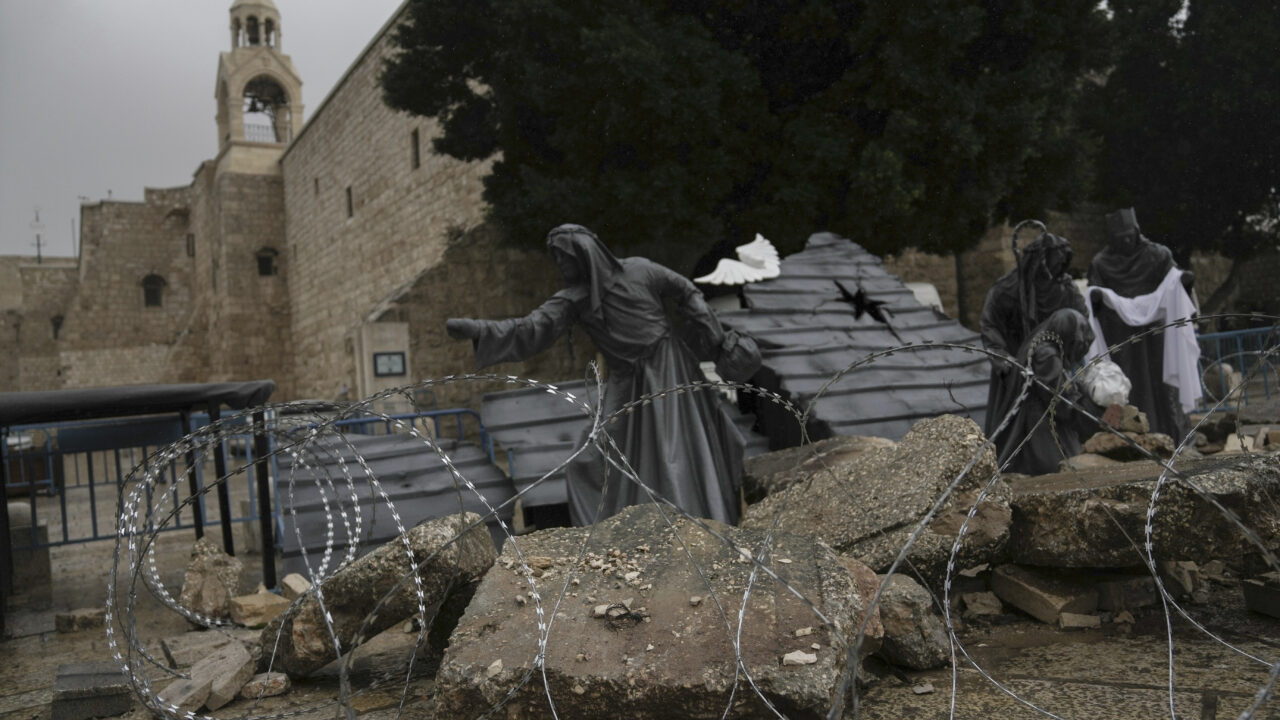 A nativity scene decorated to honor the victims in Gaza is displayed in Manger Square, near the Nativity Church, which is traditionally believed to be the birthplace of Jesus, on Christmas Eve, in the West Bank city of Bethlehem, Sunday, Dec. 24, 2023. (AP Photo/Mahmoud Illean)
A nativity scene decorated to honor the victims in Gaza is displayed in Manger Square, near the Nativity Church, which is traditionally believed to be the birthplace of Jesus, on Christmas Eve, in the West Bank city of Bethlehem, Sunday, Dec. 24, 2023. (AP Photo/Mahmoud Illean)
This story was originally published by +972 Magazine.
This holiday season, there was little reminding the Palestinian residents of Bethlehem, the birthplace of Jesus Christ, that it was Christmas time. Indeed, the city marked Dec. 25 not as Christmas, but as Day 80 of a vicious war that has engulfed all of historical Palestine since October 7.
The events that are typical of Bethlehem this time of year — the tree lighting ceremony, the bustling market, Scouts parades, and other celebrations — had all been canceled. Grief and fear predominated as two million Palestinians in the Gaza Strip continued to endure Israel’s brutal military offensive and punishing siege, which has left more than 20,000 Palestinians killed. The usual joy that lights up the city was impossible to find, making it an unrecognizable Christmas season.
The decision to let the month pass without its typical festivities was proposed by various churches and priests and approved by the Bethlehem municipality, which oversees the annual celebrations. Souvenir shops and restaurants, usually packed with tourists and visitors from all over Palestine, were largely empty. The Church of the Nativity, the oldest Christian holy site in the world, would normally be packed; these days, no one is standing in line to see the spot where Jesus is said to have been born.
Traditionally, outside the church, there would also be a towering Christmas tree. This year, in its place, Bethlehem artists have erected a monumental display of the Flight of Jesus and the Virgin Mary to Egypt. The story bears painful resonances with the violence in Gaza, where 80 percent of the Strip’s residents have been displaced, and even face the looming threat of total expulsion.
In the early 20th century, he said, about 17 percent of Palestine’s population was Christian; today, that figure stands at merely 1 to 2 percent, with most Palestinian Christians now living in the diaspora.
The Lutheran Church, a 19th century building constructed by German pilgrims, has placed the ongoing war on Gaza at center stage, literally: at the church’s altar, there is a pile of bricks and stones resembling rubble, with a doll of baby Jesus lying wrapped in a Palestinian flag.
The pastor of the church, Mitri Raheb, told +972 that the display was the only way to make Christmas feel relevant this year, hoping it would inspire thoughts and prayers for those lying under the rubble in Gaza. “The elements of the Christmas story resonate in our [Palestinian] story,” he said. “Christmas can speak to us in a very profound way. It’s about God’s solidarity with us. We hope that Jesus is looking upon [Gaza] and that He is with them.”
Reverend Fadi Diab, of the Episcopal Church in Ramallah, warned that the current war might mark a dark historical moment for Christians in the Middle East, and in Palestine in particular, where Christian life has been especially precarious under the weight of the occupation. In the early 20th century, he said, about 17 percent of Palestine’s population was Christian; today, that figure stands at merely 1 to 2 percent, with most Palestinian Christians now living in the diaspora.
Pastor Raheb, who is also a theologian and founder and President of Dar Al-Kalima College in Bethlehem, spoke of the gravity of this year’s loss. “One of the many tragedies of the war is that it will bring an end to the existence of the Palestinian Christians in Gaza. We can’t go on with our lives and pretend nothing is happening here. We are not in a mood for celebration. While the world looks at Bethlehem, we want them to see what’s happening there in Gaza.”
No safety in churches
Reverend Diab told +972 that Christians have lived in the Gaza region since around the third century. Markers of its rich Christian history have continued to crop up over the years: in September 2022, for example, an accidental historical discovery gave the Strip’s few remaining Christian families a sense of pride — a 1,500-year-old Byzantine floor mosaic attesting to the wealth of Christian life in Gaza.
Over the past 16 years, however — since Israel imposed its blockade on the Strip following Hamas’ takeover — Gaza’s already small Palestinian Christian population dropped by two thirds, from nearly 3,000 to just 1,000. The main reasons for this emigration, according to many from the community itself, were related to the Israeli occupation and blockade, not because of a sense of religious persecution within Palestinian society.
Since the outbreak of the current war, Christian life, like the rest of Palestinian life in the Strip, has come under severe threat. Christian sites and places of worship in Gaza have been repeatedly targeted by Israeli forces. Earlier this month, two Palestinian Christian women, Nahida Khalil Anton and her daughter Samar, were shot and killed by an Israeli sniper at the Holy Family Parish, the only Catholic church in Gaza.
Both the Catholic and the Greek Orthodox churches have been targeted by Israeli airstrikes more than once, according to the Patriarchate in Jerusalem. One such strike occurred a day before the killings of the elderly mother and her daughter, damaging the only generator and water tanks that belonged to the Latin Church, according to witnesses.
The main reasons for this emigration, according to many from the community itself, were related to the Israeli occupation and blockade.
The vast majority of the area’s Christian community are now reportedly sheltering in the Latin Church in Gaza City, in the north of the Strip, where Israeli troops have been waging a ground offensive for weeks. Several hundred of them were originally sheltering in the Greek Orthodox Church elsewhere in the city, but an Israeli airstrike forced them to flee to the other house of worship.
Ramzi Andrea, 458 is a Greek Orthodox Christian from Al-Zaytoun neighborhood in Gaza City, who was displaced with his entire family three times since the start of the war. He is now among a handful of Palestinian Christians who have fled to the southern city of Rafah, along with members of his family spanning three generations. Some of the other Christians are dual nationals who were able to leave through the Rafah Crossing with Egypt.
In 2006, Andrea, who had finished his first degree at Birzeit University in the occupied West Bank, rerouted his original plan to finish his graduate studies in Amman, Jordan, and instead returned to his beloved hometown of Gaza City. Despite Israel launching its siege the following year, and the repeated wars ever since, he chose to stay in the Strip, resisting the urge of many of his peers to try to leave the tiny coastal enclave.
Soon after the start of the current military offensive, the Israeli army ordered all the residents of Andrea’s neighborhood in Gaza City to relocate down south. Andrea initially refused and instead took shelter in the Greek Orthodox Church, but after the compound was hit in late October, he had to relocate again with his family and moved to the central city of Deir Al-Balah. “We had to evacuate several times until we reached Rafah, the farthest point in the south,” Andrea told +972.
‘We’ve lost the joy. We have only prayer’
“For 80 days we have been seeing all sorts of struggle amid the continued targeting of churches and places of worship, and the loss of contact with people especially in the north,” Andrea continued. “We lost a lot of friends during this journey, and we lost connection with our people in the church.”
“All this is unbearable when it comes without a political horizon,” he added. “We are now among the hundreds of thousands of refugees who are now looking for medicine and warmth.”
Andrea, a banker, was forced to abandon the 50-year-old, family-run business in Gaza City’s famous commercial center, Al-Rimal. Years ago, he had wanted to start a venture to help emerging businesses in the besieged Strip to advertise their products and their success stories. But soon after the battles between Israeli forces and Palestinian armed groups intensified in Deir Al-Balah, he was forced to evacuate again and move to Rafah with his family.
“Today is like any other day to us, not Christmas Day,” he lamented. “We want to mourn. We don’t want to celebrate — we don’t feel that we are able to. We have lost the joy. We have only prayer.”
“We have lost the joy. We have only prayer.”
Communication with the remaining families at the Latin Church in the north is very difficult, he explained. “When we hear a ringtone, the whole family gathers just to hear a hello from there. We are barely in touch,” he said with a sorrowful voice.
“The general thought among all Palestinian Christians now is to immigrate, after their homes and businesses were destroyed, and since there is no political horizon signaling an end to this crisis,” he added, expressing his fear that the total destruction of Gaza is “sweeping away everyone either under the rubble or into the desert.”
“My home, my neighborhood, my church, the roads leading to my house, even my gym, have been razed to the ground, with the whole world watching. There’s nothing left for the 2 million Gazans. I can’t imagine what would be the case for the few remaining Christians,” he said.
Back in Ramallah, Reverend Diab similarly worried that Christian life in Gaza could be wiped out entirely. “Hitting churches, like hitting hospitals and schools, sends a message to all Palestinians that no place is safe,” he said. “Without the people, the churches will turn into museums.”
Your support matters…Independent journalism is under threat and overshadowed by heavily funded mainstream media.
You can help level the playing field. Become a member.
Your tax-deductible contribution keeps us digging beneath the headlines to give you thought-provoking, investigative reporting and analysis that unearths what's really happening- without compromise.
Give today to support our courageous, independent journalists.
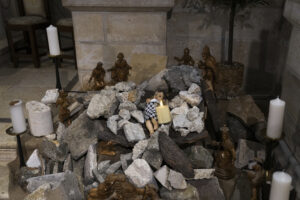
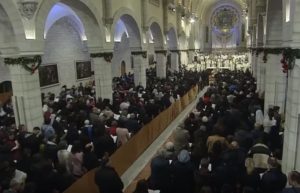
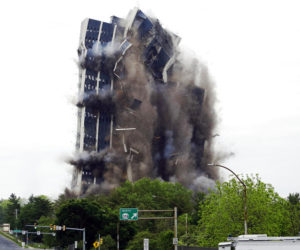
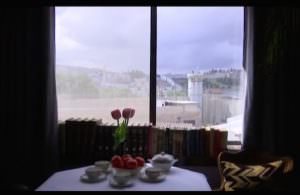
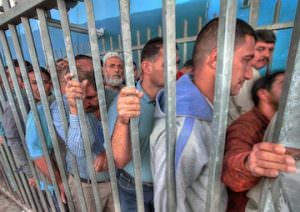
You need to be a supporter to comment.
There are currently no responses to this article.
Be the first to respond.